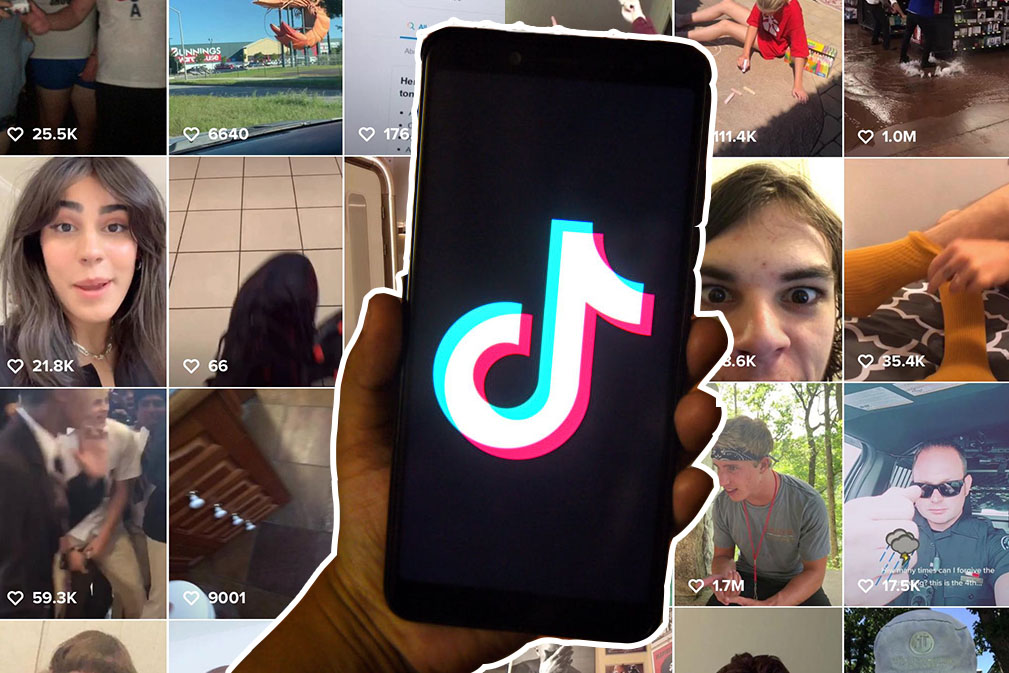
There’s a running gag on TikTok that sums up the experience of most on the platform: we all came here to laugh at this dumb, embarrassing app, and now we’re stuck here forever, unable to pull ourselves away.
The fastest rising app of 2019 and a platform that already rivals Snapchat for impact, the Chinese-backed TikTok is opening offices around the world, pushing millions into advertising campaigns and owning the conversation at VidCon. The app took over the conference, which is regularly dominated by YouTube and traditional social, and it was hard to ignore that the kids are very much on it. If everything goes to plan, everyone else will be on it soon as well.
Already a mammoth mainstream success in China, the app’s corporate salesmen will be racking their brains to figure out how to turn the platform’s huge audience into dollars. However, for thousands of people who latched onto the app before it became popular, fostering niche communities and subcultures, that same reality brings with it unique challenges
A platform constructed on the backs of people sharing things they never thought would go mainstream is now globally popular. You see TikTok ads on the street. You see TikTok ads on flyers. You see TikTok ads on Twitter and Facebook and Snapchat, too. People are always doing weird things online, but it’s usually because of a (somewhat ill-conceived) idea that no one will really ever see it. What happens when a haven for the weird and the shy and the creative goes mainstream? If TikTok becomes as successful as it hopes to be, we’ll soon find out.
A TikTok user with over 20,000 followers, @lottaavacada tells me TikTok is like a zoo. “You stand outside of the cage and point at it and enjoy it and examine it rather than diving into it yourself, because it’s kind of a frowned-upon app to the average person.”
“It kinda seemed like its own small weird bubble that really weird people were drawn to,” he says.
Avacada, like many TikTok creators, is earnestly aware of the way outsiders view TikTok. For the uninitiated, the app has a habit of being confusingly simple – log on, scroll, and let the algorithm work. And then there’s the unique humour which has developed on the platform, an often bizarre, regularly ironic take on the meme culture that has already grown stale on Instagram and been worn out by boomers on Facebook.
Avacada is one of hundreds of TikTok users who had a video ripped from the platform and uploaded to Twitter, under a hugely viral account called Cursed TikToks. Cursed TikToks worked on a model almost as old as social media: there’s content out there, let me aggregate it for you so you don’t have to search.
Cursed TikToks made a name for itself posting videos that, put simply, made you cringe: a girl staring into a camera crying while she dances, a man in a fedora using a foam bat as a sword, a shirtless teenage boy showing off his abs while eating a cheeseburger, a woman with a fake tail crawling around her house on all fours. Many of the videos are based entirely off ‘challenges’ that TikTok itself promotes, asking users to follow a dance trend or mime to a song. Many are so bizarre you probably don’t want them explained, like a man talking directly into the camera as if it’s his infant child.
Recently, Cursed TikToks was permanently suspended from Twitter after amassing hundreds of thousands of followers.
Avacada, whose inclusion on the account featured him filling a dead fish with oats and eating out of it, paints TikTok as a community that could be about to face a clash between the ironic community that refuses to make a “normal” video and the normie mainstream.
“I wouldn’t dare go on Facebook and do one of those stupid quizzes like ‘What Harry Potter Character Are You?’ and then share the results for all of my friends to see,” he says.
“The reason for that is because I personally see that as cringe and really stupid. I don’t think anyone really cares what Harry Potter character I’d be. No, the normies, they don’t feel that way. To them its ‘oh, cool, I bet all my friends want to see this’.”
“But then you scroll through TikTok and you see thousands and thousands of people who have no problem using the platform the way it’s meant to be used, which is making really cringe dancing videos and lip syncing to scenes from the office.”
The creator of Cursed TikToks is a 21-year-old from America who asked to remain anonymous. They said they made the account in July, but weren’t particularly enamoured with TikTok as a platform beforehand.
Their usage of TikTok increased as the popularity of their compilation Twitter account blew up. In its first 18 days, Cursed TikTok’s followers rose dramatically from zero to over 100,000 followers.
“I think people like it because they’re getting concentrated bad content and don’t have to download the app and sift through themselves,” said the admin.
“It’s a combination of two things I think: One being sort of morbid curiosity, like watching a train-wreck, but instead of a train it’s a horny weirdo lip-syncing and wearing a collar.”
A few weeks into creating Cursed TikToks, the admin had to issue a statement telling followers not to abuse or send death threats to people who featured on the account. When I asked them about this incident they refused to comment.
Worried my husband won’t like me anymore after I watch every single cursed tiktok right next to him
— sprich (little Henry Virginia sweetspire) (@SullivanJones) August 14, 2019
Cursed TikToks, and the hazards accounts like it can bring to people, will only become more constant as TikTok pushes into the mainstream. Cross-platform featuring and clout-hunting is part of the internet – and its also something that many would-be creators and influencers count on.
Richard Ahn is a 17-year-old from Texas who has been on TikTok since March. His funny videos and eager embrace of memes on the platform have seen his follower count grow to almost 280,000 since then.
Ahn says he doesn’t think TikTok is a stable platform, but hopes creators move away from its lip-syncing origins. Pushing the app into the mainstream comes not from embracing what made it what it is, but developing it towards platforms that have already been successful. Like Vine.
“Me and other creators are making short comedic videos to bring back Vine vibes,” he says.
“On YouTube there are TikTok compilations titled ‘TikToks that could’ve been great Vines,” or like ‘TikToks that are like vines,”.
I ask Ahn about one of his videos that featured on Cursed TikToks. He seems unfazed, and more concerned that he wasn’t properly credited.
“I don’t care about the video being [taken] out of context, but I get so triggered and frustrated when meme pages don’t credit creators and then make money from ad revenue for views” he says.
Even when it was known as Musical.ly, before users were merged into what we now call TikTok, the app had limits – the most obvious being the requirement to create video. Musical.ly struggled to grow beyond its initial cult following because not everyone wanted to film themselves in embarrassing situations or dancing. It turns out lip-syncing has a ceiling. TikTok solved these problems, expanding the format’s capabilities to accommodate a more ‘narrative’ structure. Almost a billion dollars worth of investment later and the world has itself a new (and competitive) platform.
When you think of platform that has enabled and encouraged its users to explore who they are, navigating the path from underground to mainstream, Tumblr is top of that list. Despite its own controversies – including a constantly-discussed ban on NSFW content – few would argue that Tumblr wasn’t one of the more positive spaces on the internet (I’ll admit: it’s a low bar.)
Amanda Brennan is the Head of Content, Insights, and Social at Tumblr and has been working at the site since 2013.
“I think there’s always going to be people who feel comfortable in being their truest self when it’s not attached to who they are in the real world,” she tells me, “and as more people do, they find confidence in their community.”
If a niche or counterculture exists, you’ll likely find it on Tumblr. Brennan rattles off an encyclopaedic knowledge of the different and the interesting: an aesthetic known as goblincore which lusts over gems and coins and eating dirt, a musical called “Be More Chill” that built up a devoted following, and the furby community, driven into utter chaos by the creation of a “long furby“, a sort of bizarrely stretched out version of the children’s toy.
https://twitter.com/VinegarSaint/status/1163132533988614150
“I think about Comic-Con a lot,” she says. “Like, people go to smaller conventions, and that kind of celebration of your nerdiness along with your gender and sexuality… that may have started on Tumblr. You figure out your gender or your sexual identity… and then you feel confident after establishing that online to bring it to the real world.”
How TikTok ends up in the cultural zeitgeist could dictate its long-term success. If users who flocked to the platform because it was safe find themselves exposed or let down, where do they turn? Tumblr? Some forum? Another app, waiting to explode in popularity? These are the most dangerous moments of a social network’s development, where the people in charge must decide how hard they will work to hold on to their initial audience, or to push forward with a larger net.
TikTok is going to be successful. By many metrics it already is. Gigantic in its native China (under a different name), growing rapidly on app rankings, and entering the supple and easily manipulated brains of the world’s youth, the app has started to cross the river that splits between teen sensation and mainstream success. It will, no doubt, continue.
You might think you’re immune to that, safe in the knowledge that a passing cultural phenomenon will fly over your head quickly and vaguely. But one day, when you’re sitting on the couch with nothing to do, it will happen.
You’re not on TikTok because you don’t understand it, or your friends aren’t on it, or you think it’s just for children – but you keep seeing videos on Twitter and Facebook and Instagram. Eventually, it all becomes too much, and you give in to the crippling fear that you’ll miss out on a game everyone’s playing. They’re all laughing and dancing and creating a cultural movement. Why should you miss out? So you download the app and scroll for a while – you might even upload a video – and then you log out and you either forget about it forever or you’re magnetically drawn towards it every day for a while.
A platform isn’t mainstream because everyone uses it forever. It’s mainstream when people use it for no reason at all. If that’s not you just yet, it will be. Soon.







